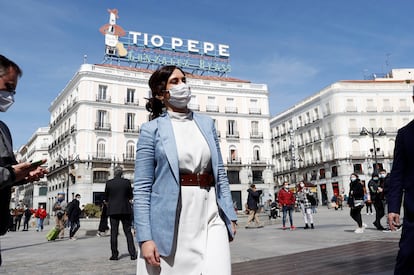The president of the Community of Madrid, Isabel Díaz Ayuso, at Puerta del Sol on March 22, Chema Moya / EL PAÍS
We need funerals to say goodbye, and other lessons from the pandemic
92,000 deaths in a year: Spain is one of the countries with the highest excess of deaths in the pandemic
This has been, and is, managing death.
Any sensible government, of any ideological color, has had the mission of preventing the number of deaths from reaching intolerable levels and, at the same time, that the precautionary measures were not so severe as to suffocate the economy, that social mechanism that allows people earn a living.
As in wars, the dead have been one of the factors to consider.
Not the only one.
I say this without looking away from the underlying atrocity: agony, pain, loss, a colossal human disaster.
Those who have suffered the most from the coronavirus will hardly share my point of view.
In wars, the military should be trusted, but they should never be left in full control of operations.
Something similar happens in a pandemic.
Scientists know how to fight the virus, but not how to run a society.
In wars, important moral demands are often set aside: did someone raise the Kantian ethical imperative during the Normandy landing?
It had to be done and it was done.
The same in pandemics.
The question is to fight them and achieve a victory that is not Pyrrhic: there is a tomorrow.
And the less poor and hopeless that morning is, the better.
I think the left, in Spain and in many other places, has tended to align itself with scientists and with ethics.
Especially where it does not rule.
He has advocated more confinement and more caution.
Open bars?
How awful!
We take for granted, of course, that the horrified have never lessened their pain in the soul with a beer on a terrace or a dinner in a restaurant.
Madrid is one of the places where the management of death has been carried out in a cold, cruel and efficient way.
For someone who, like me, has lived through the very long Argentine confinement and the feeling of defeat of the deserted streets, arriving in Madrid is breathing.
It is a glimpse of the day after.
It is to feel that there is life amid so much fear.
With its dead and sick, with the horror of the residences, with the drunken French, with the weekend escapes, with whatever they want: from afar, Madrid looks like a great spot of light.
Isabel Díaz Ayuso, the president of the Community of Madrid, seems to me an unscrupulous person, without the slightest attachment to the truth and determined to achieve her objectives (ideological and personal) going beyond ethics and even the law.
I could never give him my vote.
On the other hand, I would not be surprised if many Madrilenians, even among those who have suffered the most, take into account that they endure the pandemic with less daily stress than citizens of other places.
Nor would I be surprised if many Madrilenians took into account that when this is over, Madrid will have increased its economic supremacy within Spain.
Finally, I would not be surprised if many Madrilenians appreciated the cocky attitude of Isabel Díaz Ayuso: saving the enormous intellectual, political and historical distances, that is what the British appreciated most of Winston Churchill in the darkest hours of the United Kingdom.
In wars, as in pandemics, the death count is secondary.
The important thing is the victory and what lies after it.
Sorry for the rawness.

